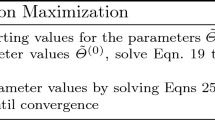Abstract
Social lending is, in its broadest sense, a certain breed of financial transaction (primarily lending and borrowing) that occurs directly between individuals without the intermediation or participation of a traditional financial institution. Social lending is a dynamic trading mechanism that can directly match one consumer with another consumer. Most manual transaction processes conducted by traditional financial institutions can be done automatically and tailored to each consumer in social lending so that every player can maximize his own values in the transactions. The processes that could be automated include adjusting interest rates, creating incentives for borrowers to return money, recommending lenders and borrowers, creating portfolios, etc. In this paper we focus on an incentive mechanism for borrowers because they are crucial for dynamic social lending since they could help increase worth and reduce payment delays. We propose an incentive mechanism that improves a borrower’s payment delay score. The mechanism offers incentives for payment with rewards (penalties) to borrowers. We demonstrate the efficiency on our proposed methods by conducting agent simulations.
Preview
Unable to display preview. Download preview PDF.
Similar content being viewed by others
References
Lending Club, http://www.lendingclub.com/
Prosper, http://www.prosper.com/
Zopa UK, http://uk.zopa.com/ZopaWeb/
Zopa USA, https://us.zopa.com/
Grameen Bank, http://www.grameen-info.org/
Ghatak, M.: Group lending, local information and peer selection. Journal of Development Economics 60, 27–50 (1999)
Ghatak, M., Guinnane, T.W.: The economics of lending with joint liability: Theory and practice. Journal of Development Economics 60, 195–228 (1999)
Guttman, J.M.: Assortative matching, adverse selection, and group lending. Journal of Development Economics 87, 51–56 (2008)
Chowdhury, P.R.: Group-lending: Sequential financing, lender monitoring, and joint liability. Journal of Development Economics 77, 415–439 (2005)
Falkinger, J., Fehr, E., Gachter, S., Winter-Ebmer, R.: A simple mechanism for the efficient provision of public goods: Experimental evidence. The American Economic Review 90, 247–264 (2000)
Vickrey, W.: Counterspeculation, auctions, and competitive sealed tenders. The Journal of Finance 16, 8–37 (1961)
Clarke, E.H.: Multipart pricing of public goods. Public Choice 18, 19–33 (1971)
Groves, T.: Incentives in teams. Econometrica 41, 617–631 (1973)
Author information
Authors and Affiliations
Editor information
Editors and Affiliations
Rights and permissions
Copyright information
© 2009 Springer-Verlag Berlin Heidelberg
About this paper
Cite this paper
Iwakami, M., Ito, T., Delgado, J. (2009). An Incentive Mechanism for Increasing Repayment Rate for Online Social Lending. In: Chien, BC., Hong, TP., Chen, SM., Ali, M. (eds) Next-Generation Applied Intelligence. IEA/AIE 2009. Lecture Notes in Computer Science(), vol 5579. Springer, Berlin, Heidelberg. https://doi.org/10.1007/978-3-642-02568-6_57
Download citation
DOI: https://doi.org/10.1007/978-3-642-02568-6_57
Publisher Name: Springer, Berlin, Heidelberg
Print ISBN: 978-3-642-02567-9
Online ISBN: 978-3-642-02568-6
eBook Packages: Computer ScienceComputer Science (R0)




